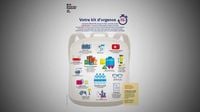The European Union is taking significant steps to address the pressing need for civil preparedness among its citizens as geopolitical tensions rise and natural disasters become more frequent. The European Commission has proposed a new strategy aimed at ensuring that EU member states are better equipped to handle various crises, including wars and pandemics. According to Ursula von der Leyen, President of the European Commission, "Europe must prepare for war." This statement encapsulates the sentiment echoing through the EU institutions as they grapple with the realities of potential future conflicts and disasters.
On March 25, 2025, the European Commission announced its comprehensive approach to bolster preparedness across the continent. This strategy encompasses a wide array of recommendations for member states, focusing on the necessity of maintaining adequate supplies—such as water, food, batteries, and medications—to sustain individuals for at least 72 hours without external assistance in times of crisis. The formal presentation of this strategy is expected on March 26, 2025, with key figures like Roxana Mînzatu and Hadja Lahbib elaborating on the plans to enhance crisis readiness.
In light of growing safety concerns, the European Commission emphasizes that individual household preparedness is crucial for national resilience. The current geopolitical climate, characterized by increased risks from factors like climate change and military aggression, has prompted Brussels to advocate for a systematic approach to emergency readiness. The strategy outlines 30 measures designed to fortify the EU's capacity to respond to emergencies, which range from nuclear accidents to cyberattacks.
One notable initiative within this preparation strategy is the European Commission's recommendation that every household stockpile basic survival supplies. A draft document highlights the need for citizens to have sufficient resources, including six liters of bottled water, non-perishable food, batteries, medications like paracetamol, and cash readily available. This guideline reflects a broader urgency recognized by the Commission, accentuated by the current threats posed by geopolitical conflicts, especially the situation involving Russia.
Across Europe, individual member states have already begun implementing measures in anticipation of the EU's recommendations. Finland, for instance, launched a website dedicated to emergency preparedness, advocating for households to maintain appropriate reserves of essential products for potential crises. This proactive approach is mirrored in Sweden, where recent guidelines emphasize the importance of individual readiness against military or humanitarian crises.
As France prepares to distribute a survival manual to households during the summer of 2025, the comprehensive guide will provide crucial insights into emergency readiness. This manual is designed to equip citizens with practical advice and instructions on how to prepare an emergency kit that includes vital supplies and outlines emergency procedures tailored to different scenarios. France's effort symbolizes a commitment to reinforcing the EU's collective security framework.
During a press conference, Roxana Mînzatu reiterated that national governments continue to bear primary responsibility for managing emergencies. However, she expressed that "the EU wants to find out how it can provide added value by improving coordination and information exchange" among member states. This recognition underscores a collective understanding that no nation operates in isolation anymore, with threats frequently crossing borders and affecting multiple countries.
The overall strategy intends to provide comprehensive support to EU member states, covering not only natural disasters but also acts of terrorism and military conflicts. In an environment where the threat of conflict and instability lurks on the horizon, European leaders are beginning to recognize the importance of long-term preparation. As Hadja Lahbib noted, the strategy aims to enhance the EU's role in supporting member states against any crises that jeopardize security or public safety.
This initiative is not merely a response to historical actions but comes in the wake of changing dynamics within Europe. Ursula von der Leyen's remarks regarding the need for military readiness underscore an essential pivot in discourse surrounding defense in Europe, where defense expenditure is amid significant deliberation across member states. The commission's proposals symbolize more than preparedness; they reflect a broader vision of a resilient Europe capable of confronting unprecedented challenges.
As the EU plans for its future amidst uncertainty and risk, how prepared are its citizens to face potential crises? The survival kit initiative highlights a significant step forward in fostering a culture of awareness and readiness. With citizens being urged to actively participate in their safety, the collective response of individuals could very well define Europe’s resilience.
In conclusion, the recently proposed European strategy sets a foundational framework for strengthening civil preparedness throughout the continent. With a growing emphasis on collaboration and shared responsibilities in crisis management, the EU aims to cultivate a proactive rather than reactive stance toward future threats. By empowering households to be self-sufficient for three days in emergencies, the European Commission lays the groundwork for a more secure and resilient Europe.




